632-Sirshree. & Radhanath Swami
------------------------------------------------------------------------------------------------------------------------
-----------------------------------------------------------------------------------------------------------------------
1.#Celebrating Diwali: The Deeper Purpose : November 5, 2021. 9:00AM : Sirshree.
-----------------------------------------------------------------------------------------------------------------------
Diwali, the festival of lights, is celebrated with pomp and enthusiasm all over India. It denotes the return of Lord Rama to Ayodhya after his victory over the demon king, Ravana.
The name Ayodhya is made of “A-yudh,” which means the absence of war, the non-existence of conflict. This state of peace and joy can only arise with the return of Lord Rama, who symbolizes the divine presence. Thus, Diwali celebrates the return of love, joy, and peace in our lives upon the destruction of the demonic tendencies represented by Ravana.
Since olden times, people have followed various customs to celebrate the festive season of Diwali. All these celebrations can be attributed to the following reasons.
Firstly, a celebration helps people emerge from boredom. It helps people get out of mundane mechanical existence and re-align with the vibration of happiness. Though it serves people to experience a temporary form of happiness, it reminds them of the experience of permanent bliss that is the very purpose of human life. It compels one to ponder how one can experience lasting happiness. How wondrous it would be if we could find permanent happiness in life!
Secondly, people take it as an opportunity to tidy and clean their homes and offices of all unwanted things that get stacked over time. At a deeper level, Diwali comes as an opportunity for us to introspect and cleanse ourselves internally of the limiting beliefs that do not serve us and tendencies that lead us astray. These beliefs and tendencies that we have accumulated over the years are the real cause of unhappiness.
Further, the third reason is to foster harmony in relationships. During Diwali, people shower blessings, distribute sweets to near and dear ones. People venture to send greetings on this auspicious occasion, thus sending their best wishes to friends and relatives. During this festive season, one experiences the joy of giving, which comes from our true essence.
The fourth reason is the opportunity that we get to express ourselves creatively. People get an occasion to bring out their capabilities, be it cooking, preparing lampshades, decorative designs, greeting cards, etc. Thus, this festival helps us express our creativity, which is again the quality of the Self, our true nature.
The fifth reason is the lamps lit during the festival, due to which it’s called the festival of lights. These lights serve as reminders to go within oneself and recognize that inner light of aliveness, the permanent light that never goes out, which is available at all times.
We tend to be so engrossed in Maya that we do not recognize these profound indications that have been hidden within our customs by our forefathers to serve us as reminders for the inner quest.
During Diwali, it is also a custom to buy new things like attire, home décor, appliances, etc. Being unaware of the subtle difference between their needs and wants, people buy something they want at the cost of overlooking their needs. In this context, it helps to consciously ask ourselves whether a particular item is our need or want before deciding to buy it.
We also celebrate Diwali with fireworks. We witness people firing little flares that rise and dazzle momentarily in the night sky. This points towards the flares that arise within us – our thoughts – that sparkle in the sky of our conscious awareness and then fade away. Just as we burst firecrackers with care and awareness from a distance, we should also learn to observe the thoughts rising within us with awareness by keeping a distance from them!
Another custom followed in many households is the worship of the broom. Here, the broom is a symbol of Sadhana – spiritual practice, meant to:
Cleanse ourselves within to let our true essence of pure awareness be revealed;
Surrender the judging and comparing aspects of the mind to be free from its exploits and let the intuitive mind function;
Be in the feeling of abundance to offer the right prayer to Goddess Laxmi for the true and lasting wealth of health, wisdom, harmony, and prosperity;
Lead a simple life with a higher understanding.
By understanding these indications, let’s celebrate this Diwali in earnest by showering love, joy, and peace to one and all.
END.
======================================================================
2.##How To Bask In The Light Of The Divine-Self : November 5, 2021 : Radhanath Swami : ISKON.
---------------------------------------------------------------------------------------------------------------------
The Bhagwad Gita, verse 8:15, states that the world is indeed an evanescent place of hardships. Social distress stems from the individual level with the mind at its source. The Gita further adds that the mind can be your best friend and also your worst enemy.
When intelligence gets ousted by the rusty mind, the power of reasoning, logic, and judgment enter into a stay-put mode. The Gita states that by nature, the mind is restless, obstinate, and overbearing. Just as we have a hard time dealing with toddlers, the same is the case when it comes to mind. It keeps vacillating between extremes, is quick to judge, snubs good advice, scoffs at discipline, and is averse to wisdom. When the mind substitutes intelligence as the centre of command, it becomes a lot easier for one to succumb to every temptation hands down.
Ravan’s Mind
Ravan, the formidable demon in the Ramayan, also happened to be a yogi. The definition of a yogi is one who is greater than an ascetic, greater than the wise, and greater than a materialist. But Ravan was licentious. Though he had tremendous resourcefulness, reflecting in his conquest over the upper and lower planetary systems, yet he would succumb to the lower propensities of the mind, like lust, anger, and greed. What a travesty! The prowess of Ravan was eclipsed by his submission to the mind. As a result, he acted out subversively, deceitfully, and insidiously. Though powerful, yet he tripped over temptations at the drop of a hat, alluding to his weakness of the heart. The Gita calls this weakness ‘hridaya daurbalyam’, the conditioning, samskaras, the things stuffed in the subconscious state.
According to Patanjali’s Yog Sutra, samskaras are also termed as ‘chitta vritti’, the preconditioning, the shadow-self. The Gita talks about the three prominent vices that subsume the conditioned state. They are lust, anger, and greed. Added to these are three more vices: pride, envy, and illusion. All six can shroud the intelligence. When this happens, it should come as no surprise that people suffer both at the individual and collective levels. The formidable six vices become excited whenever they find the mind as the centre of command, thus, harnessing all available resources to satiate their demands.
Illuminating Texts
Wisdom texts like the Gita act as a source of great illumination to come out of the shadow-self. It is said that for those endeavouring on the break-through path of self-discovery from the shadow-self, the Divine kindles from within, the lamp of transcendental wisdom.
Just as a nation's capital is fortified by strong governance, similarly, when divine wisdom dawns upon consciousness, intelligence gets fortified, setting us free from the shadow of samskaras and the compulsiveness of the mind. It illumines our true nature as part of the Divine-Self. We beam with love, selflessness, and purity, and cooperate with others harmoniously. It elevates us to the threshold of divine love.
The writer is the spiritual guru at ISKCON
END.
========================================================================







Comments
Post a Comment